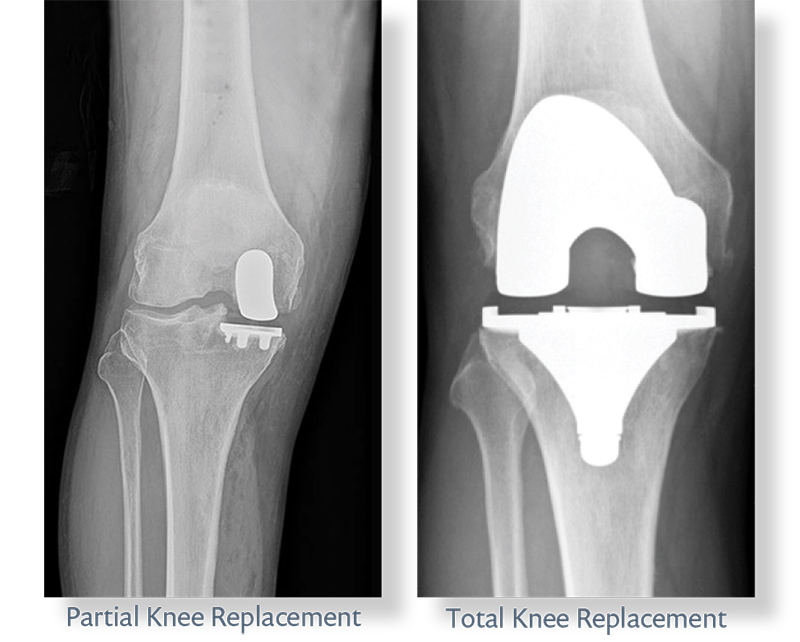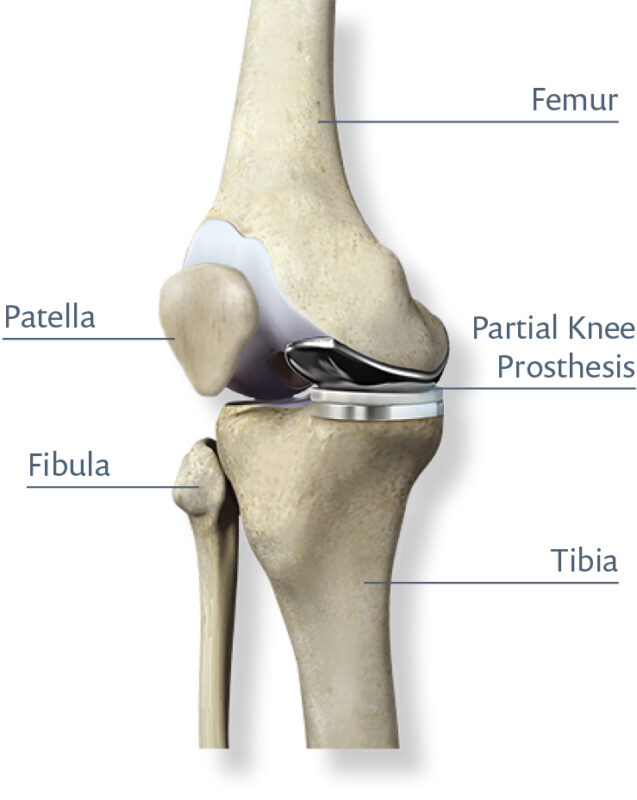Q & A: Unicompartmental (Partial) Knee Replacement Surgery
Would you be a good candidate for unicompartmental knee replacement surgery?
Dr Dan Fick answers your questions about this partial knee replacement option.
What Is Unicompartmental Knee Replacement?
Unicompartmental knee replacement , also called uni knee replacement, is a type of partial knee replacement surgery that resurfaces only a portion of the knee that is damaged, for example, as a result of osteoarthritis of the knee.
It’s an alternative to total knee replacement where the entire joint is removed and replaced with prosthetic parts.

Unlike total knee replacement (left) , uni knee replacement surgery (right) resurfaces only the damaged part of the knee.
What Happens During Uni Knee Replacement Surgery?
Partial knee replacement surgery involves making an incision at the front of your knee. I’ll check the damage to your knee at this stage, to make sure it is confined to just one area.
It’s important to know that, if I go in and find that the damage is more extensive than we first realised, I may have to do a total knee replacement instead. But don’t worry, we will have discussed this possibility well before your surgery!
During the surgery, which I’d expect to last for about 1 hour, I will remove the damaged bone surfaces from one side of your thighbone and shinbone and resurface them with an artificial metal surface. A plastic liner will be placed between the new parts to help them function smoothly.

Am I a Good Candidate for Uni Knee Replacement?
We can discuss your options when you come to see us. Unicompartmental knee replacement could be a good option for you if osteoarthritis has damaged only a part of your knee joint, such as the medial component of your knee.
Uni knee replacement might not be your best option if you have inflammatory arthritis, damage to your ligaments or very significant stiffness in your knees.
If your whole knee joint is damaged, I would recommend total knee replacement.
What Are the Benefits of Partial Knee Replacement?
Unicompartmental knee replacements can provide terrific results in both younger and older patients, and the results can last for the long term.
Compared to a total knee replacement, partial knee replacement offers a quicker recovery time with less pain after surgery, less blood loss during surgery and a reduced risk of blood clots or infection after surgery.
Patients tell me they also feel that their partial knee replacement feels quite natural, and it can bend well. This could be because the partial knee replacement preserves most of your knee, including the bone, cartilage and ligaments in the healthy part of your knee.
What Are the Downsides of Partial Knee Replacement?
One disadvantage of partial knee replacement is that you might need a total knee replacement in the future, if arthritis develops in the part of your knee that we didn’t replace during the uni knee procedure. Of course, some people with total knee replacement also need additional surgery but there’s a higher chance of later surgery if you have a partial knee replacement. We can discuss the pros and cons of uni knee replacement when you come to see us.
How Long Will Recovery Take?
Your stay in hospital may be 1–3 nights. You’ll be able to start putting weight on your knee immediately after surgery, although you may need walking aids for the first few days or weeks.
You should be able to walk freely without help within 3 months so you can get back to your regular activities.

